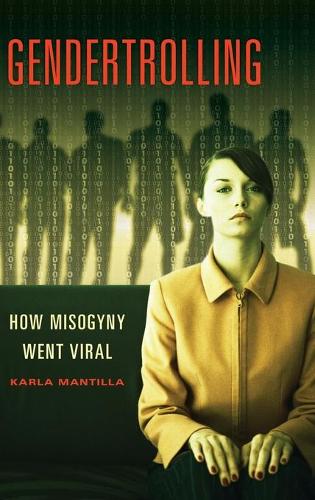
Gendertrolling: How Misogyny Went Viral
(Hardback)
Publishing Details
Gendertrolling: How Misogyny Went Viral
By (Author) Karla Mantilla
Bloomsbury Publishing PLC
Praeger Publishers Inc
31st August 2015
United States
Classifications
Tertiary Education
Non Fiction
Gender studies: women and girls
Digital and information technologies: social and ethical aspects
364.15082
Physical Properties
Hardback
280
Width 156mm, Height 235mm
652g
Description
Gendertrolling arises out of the same misogyny that fuels other "real life" forms of harassment and abuse of women. This book explains this phenomenon, the way it can impact women's lives, and how it can be stopped. Designed to educate the general public on a popular and brutal form of harassment against women, Gendertrolling: How Misogyny Went Viral provides key insight into this Internet phenomenon. The book not only differentiates this violent form of trolling from others but also discusses the legal parameters surrounding the issue, such as privacy, anonymity, and free speech online as well as offering legal and policy recommendations for improving the climate for women online. The analysis of social media and legal aspects of the book make it highly suitable as a reliable source to many modern classes. Additionally, increased awareness among the general and scholarly public of the phenomenon of gendertrolling would help galvanize widespread support for laws, policies, new online content provider protocols, and positive social pressure.
Reviews
Mantilla's work is valuable . . . for gathering firsthand voices of gendertrolling victims about their experiences, reactions, and attempts to fight back. Furthermore, the author successfully contextualizes gendertrolling in the history of misogyny. By doing so, she persuasively argues that gendertrolling is not unique to digital experiences but is a new form of misogyny and abuse against women. She lists various recommendations for legal protections and strategies to fight against gendertrolling and generate solutions. Summing Up: Recommended. All levels/libraries. * Choice *
The contemporary issues addressed in the book are relevant to undergraduate and graduate instructors seeking to offer guidance in new media, prejudice, and the ethics of unrestricted 'free speech' in Internet environments. Each chapter can be taught independently, allowing for text-based questions and discussion in a small graduate-level seminar or a large undergraduate lecture. . . . Mantilla's book has utility beyond the classroom settingbecause it contributes to a larger cultural conversation concerning the regulation of online sexist speech. * Sex Roles *
Author Bio
Karla Mantilla is managing editor at Feminist Studies, an interdisciplinary women's studies journal.
